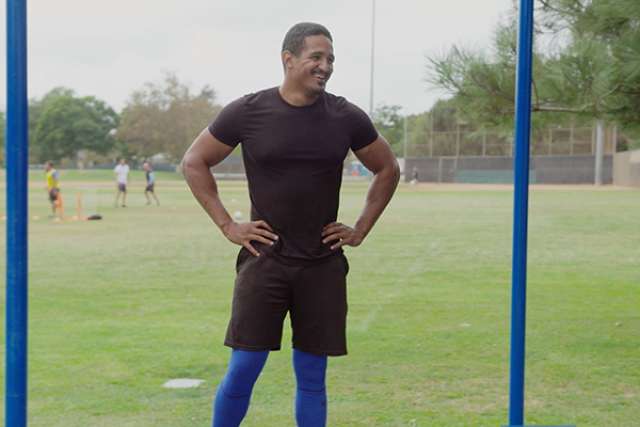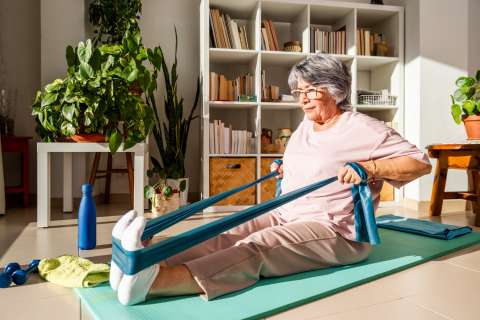For Evie Junior, living with sickle cell disease has been like running a marathon.
"But it's a marathon where as you keep going, the trail gets rockier and then you lose your shoes," the 27-year-old said. "It gets harder as you get older. Things start to fail and all you can think about is how much worse it's going to get down the road."
In sickle cell disease, a genetic mutation causes the blood-forming stem cells — which give rise to all blood and immune cells — to produce hard, sickle-shaped red blood cells. These misshapen cells die early, leaving an insufficient number of red blood cells to carry oxygen throughout the body. Because of their sickle shape, these cells also get stuck in blood vessels, blocking blood flow and resulting in excruciating bouts of pain that come on with no warning and can leave patients hospitalized for days.
The disease affects 100,000 people in the United States and millions around the world, the majority of whom are of African or Hispanic descent. It can ultimately lead to strokes, organ damage and early death.
As a child growing up in the Bronx, New York, Junior had to have his gall bladder and spleen removed due to complications from the disease, but he refused to let his condition limit him. He played football, basketball and baseball during the day, even though on some nights he experienced pain crises so severe he couldn't walk.
"It was just really routine if I had a sickle cell crisis," he said. "Going to the emergency room, staying in the hospital, coming out in a few days and then getting back to normal life."
'I want to create a better future'
When he was 24 and living in Portland, Oregon, Junior began working as an emergency medical technician. He adopted the same mentality — trying to treat his pain episodes the best he could, and hoping they would resolve overnight so he could get back to work. Around that time, though, the crises became harder to manage. He developed pericarditis, an inflammation in the layers of tissue around his heart, and needed six weeks to recover.
"The big worry with sickle cell disease is that you're going to die young from some type of complications or damage to your organs," he said. "In the last couple of years, I've been seeing that slowly happen to me and I can only suspect that it's going to keep getting worse. I want to create a better future for myself."
In July 2019, in pursuit of that future, Junior enrolled in a clinical trial for an experimental stem cell gene therapy for sickle cell disease. The study is led by UCLA Broad Stem Cell Research Center physician-scientists Dr. Donald Kohn and Dr. Gary Schiller and funded by the California Institute for Regenerative Medicine.
The therapy, developed by Kohn over the past 10 years, is intended to correct the mutation in patients’ blood-forming stem cells to allow them to produce healthy red blood cells. Kohn has already applied the same concept to successfully treat several immune system deficiencies, including a cure for a form of severe combined immune deficiency, also known as bubble baby disease.
But sickle cell disease has proven more difficult to treat with gene therapy than those other conditions. Junior volunteered for the trial knowing there was a chance the therapy wouldn't cure him.
"Even if it doesn't work for me, I'm hoping that it can be a cure later down the road for millions of people," he said.
In July 2020, Junior received an infusion of his own blood-forming stem cells that had been genetically modified to overcome the mutation that causes his disease.
"The goal of this treatment is to give him a future, let him plan for college, family or whatever he wants without worrying about getting hospitalized because of another pain crisis," said Kohn, a distinguished professor of microbiology, immunology and molecular genetics, pediatrics, and molecular and medical pharmacology at the David Geffen School of Medicine at UCLA.
Reason for optimism
Three months after his treatment, blood tests indicated that 70% of Junior's blood stem cells had the new corrected gene. Kohn and Schiller estimate that even a 20% correction would be enough to prevent future sickle cell complications. Junior said he hasn't had a pain crisis since undergoing the treatment and he has more energy and feels out of breath less often.
"I noticed a big difference in my cardiovascular endurance in general — even going for a light jog with my dogs, I could feel it," he said.
Junior and his doctors are cautiously optimistic about the results.
"It's too early to declare victory, but it's looking quite promising at this point," Kohn said. "Once we're at six months to a year, if it looks like it does now, I'll feel very comfortable that he's likely to have a permanent benefit."
After a lifetime of dealing with the unwelcome surprises of the disease, Junior is even more cautious than his doctors. But as the weeks pass, he's slowly allowing a glimmer of hope that he could soon be someone who used to have sickle cell disease. For him, that hope feels like "a burst of happiness" that's followed by thoughts of all the things he could do with a healthy future: pursue his dream of becoming a firefighter, get married and start a family.
"I want to be present in my kids' lives, so I've always said I'm not going to have kids unless I can get this cured," he said. "But if this works, it means I could start a family one day."



